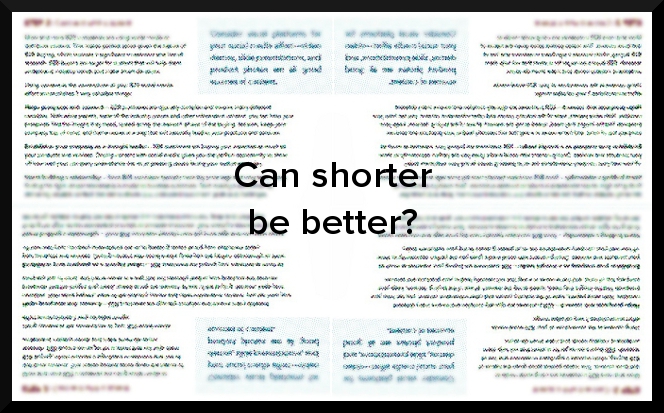Blogs began life as “weblogs:” personal pages people used to catalogue their experiences. An intimate, personal and often raw format, businesses quickly began trying to capture this same kind of energy in their own blogs.
But while you can write about how your day went in a few hundred words, you need a lot more page real estate to get into a meaty business technology topic.
So how long can a business blog be before it overstays its welcome? And how long should a blog be to engage your audience?
How long is a piece of string?
Other B2B content formats tend to have strictly defined layouts and lengths. We all have a rough idea how long an email or social media post can be before it becomes unbearably long. And though many marketers often see white papers and ebooks as interchangeable (here’s a guide to help you tell the difference), the general consensus is that these are longer-form pieces of 1,500 words or more.
But the blog? The blog can be a wide range of lengths – and there’s not a lot of agreement on what kind of word count is best for engaging your audience.
What does the research say?
When it comes to engagement, a quick Google will yield a lot of opinion pieces, articles and scientific-looking tables about what size of post is best.
One type of opinion you’ll see regularly is the idea that in the smartphone age attention spans are too low for you to hold attention after a certain number of words. And it seems the blogging community has taken this message to heart, with WordPress CEO Matt Mullenweg claiming that the average WordPress post is just 280 words long.
So, is brevity the soul of blog engagement? The research would beg to differ.
Buffer Social’s study found that blogs got the best engagement at 1,600 words. Other common stats support long-form blogs as better for engagement, and search ranking:
- On average, top ranked searches have 2,416 words
- Long content outperforms short-form posts by 40.54%
Despite the numbers being fairly convincing, Rand Fishkin of Moz says we should be careful about taking this data at face value.
After all, the data leaves a lot of questions unasked. Specifically, when it comes to how different length posts rank in search, we need to ask:
- What set of keywords does this apply to?
- Will the keywords I use see similar results?
- Is correlation the same as causation?
I’ll leave the first two questions to the SEO experts out there, but when it comes to correlation and causation: it’s safe to say there’s very little. While long content may be more engaging and rank higher, it doesn’t do those things just because it’s long. If I wrote the word “blob” 600 times, that would be no more or less readable and engaging than if I wrote it 1,500 times.
The depth-length correlation
Long posts tend to engage and rank better, but that’s not necessarily because they’re long. In general, it’s because longer posts will go into greater depth on a topic and (hopefully) be better researched. And we all know a little research and depth goes a long way to creating better content.
The key is in that depth, though. The longer word count merely allows for it. In fact, I’d go as far as to say word count is only earned once the depth is there. Radix’s own creative director David McGuire hit the nail on the head in a recent LinkedIn post, saying “a longer blog post isn’t necessarily better; it just has more words.”
If you were to chart depth against word count on a poorly drawn WordArt graph, it might look something like this:

To summarise this wonky majesty: if you have a lot of depth, you can have a lot of words without turning your blog into a shallow load of waffle.
It’s time to earn your word count
So, the next time you look at an in-progress blog and ask “is this the right length?”, think first about whether it has the right depth to justify that length.
If you’re just putting out a quick opinion piece on a topic, 400 words may be enough. If you’re really going to town on the research though, give yourself permission to break the 1,500-word barrier.
For more copywriting tips, tricks and blogs of varying length, subscribe to our monthly insights email.



